- Home
- Elmore Leonard
Escape From Five Shadows Page 11
Escape From Five Shadows Read online
Page 11
“You make very little sense,” Lizann said.
“You don’t have to understand it. Just tell him! If you wanted to help him enough to give him a gun then tell him!”
“Tell him what?”
“That the lawyer has found new evidence. Important enough to warrant a new trial. He’s already filed the motion and it’s only a matter of weeks—” Karla broke off hearing Renda’s voice.
“Well…Miss Demery.”
Lizann turned back into the room. She went to the canvas chair and sat down. Karla stepped back from the doorway as Renda entered.
“Why don’t you come in?” Lizann said. “Make yourself at home.”
Renda looked at her. “What’re you edgy about…something this girl told you?”
“She hasn’t told me anything.”
He turned to Karla. “You change your mind about causing a fuss?”
“I told you what I’m going to do.”
“You want me to tell Lizann?” Renda asked.
“If you don’t,” Karla said. “I will.”
“You could be a damn sight easier to get along with.” He looked at Lizann again. “I opened a couple of Willis’s letters by mistake, but Karla thinks I done it on purpose.”
“You know he did,” Karla said.
“So Karla thinks she’s going to make trouble for me,” Renda went on. “Going to tell her father about it. And claims he’ll call in a federal marshal. So if Karla’s going to go to all that trouble, I’m not about to admit reading the letters. Am I, Lizzy?”
“You’re admitting it right now,” Karla said. “In front of Mrs. Falvey.”
Renda’s gaze moved to Lizann. “Did you hear me admit anything?” Lizann said nothing and Renda’s eyes returned to Karla. “If a federal marshal stopped by here, Lizzy wouldn’t know anything about it.”
Karla began, “When I tell Mr. Falvey—”
“And Willis,” Renda broke in, “will tell the marshal that he read the letters and threw them away when he was finished, and if some girl out for a ride happened to find them, that’s no concern of his. All Willis will know is that he threw the letters away. You see how it is, honey?”
Karla looked at Lizann who returned her gaze almost without expression, telling nothing, least of all offering assistance. Then, to Renda again, “I don’t see how you have the nerve to admit what you just did.”
Renda shrugged. “You’re the only one hearing it. You got no witnesses. I got a man who’ll admit reading the letters and throwing them away for you to find.”
“You’re very sure of yourself,” Karla said.
“Honey, when you’re minding thirty convicts you got to be sure of yourself.”
“I’m still going to tell my father.”
“You go right ahead…And tell him for me, I want to know the day my supplies come in this week. I don’t want them laying around for some stage passenger to drop a cigar butt on. You hear me? Soon as they come in, I want to know about it.”
“You’ll notice,” Lizann said mildly, “he’s worried about his investment and not your station.”
“I’ll hear from you in a minute,” Renda said. He looked at Karla again. “You run home now. And remember what I said. Soon as it comes in I want to know about it.”
“I’m dismissed now?” Karla said.
“You’re double dismissed. Ride directly through that gate and don’t let me see your face around here till my stuff comes.”
“Mr. Renda,” Karla said, “you’re a real gentleman.”
Renda smiled pleasantly. “Thank you, Karla. Now get out before I kick you the hell out!” He saw her about to speak and he yelled, “Go on!” then kept his eyes on her until she had left the adobe, mounted her horse and ridden off toward the gate.
Lizann asked, “What did all that prove?”
“When somebody talks like that,” Renda said, “I get sick to my stomach.”
“Maybe it’s your conscience backing up on you.”
“A sermon now?”
Lizann shook her head. “Not even if I thought it would do you good.”
Renda moved to the table. He half sat on the edge of it, hooking his leg over one corner, and leaned his weight heavily against the table. Watching him, still sitting in the canvas chair, Lizann said, “Don’t make yourself too comfortable.”
“I thought we’d have a talk,” Renda said.
“About what?”
“Willis’s letters.”
“I’m not interested.”
“You want me to think you’re not,” Renda said. “You’re bustin’ to know what was in them.”
“Then keep it to yourself,” Lizann said, “and see if I bust.”
“They were from Washington.”
“I told you, I’m not interested.”
Renda came to his feet. “I’m interested! You understand that? I’m interested and we’re going to damn-well talk about them whether you want to or not!”
“As usual,” Lizann said calmly, “you’ll be talking to yourself.”
The table creaked as Renda leaned his weight on it again. “Let’s find out,” he said mildly, and noticed the look of momentary surprise on Lizann’s face. “We don’t have to yell at each other, Lizzy. Pretend you’re in Washington and you’re talking to one of Willis’s political friends. Like Mr. Everett C. Allen.”
“The letters were from him?”
“That’s better,” Renda grinned.
“Were they?”
“They were from him.”
“What did he say?”
“He was answering Willis.”
“I didn’t know Willis had written him.”
“You expect me to believe that?”
“I don’t care what you believe!”
“You should. It makes a difference.”
“I didn’t know Willis had written to him,” Lizann said evenly. “You can believe that or not.”
“Let’s say I don’t. Who is he?”
“Everett? He’s with the Department of the Interior.”
“High up?”
“High enough.”
“High enough to get Willis away from here?”
Lizann nodded. “What did he say?”
Renda’s leg, hooked over the corner of the table, began to swing slowly back and forth. He stared at Lizann and for perhaps a full minute he said nothing. Then, “What’re you so anxious to know for? You don’t even know what Willis said to him first.”
“Does it matter?” Lizann asked.
“You know damn well it matters.”
“If you are going to insist that I know what Willis wrote,” said Lizann, “there’s no use discussing it further.”
“I’ll bet you even told him what to write.”
Lizann sat lower in her chair. Her gaze went to the open doorway and she ignored Renda.
“I’ll bet Willis didn’t even want to write it. But you made him.”
Lizann’s gaze came back to Renda. “Willis asked for a transfer!”
“That’s pretty good,” Renda said. “You must’ve been rehearsing—opening your big brown eyes, looking surprised—”
“What did Everett say,” Lizann demanded.
“What do you think he said?”
Lizann hesitated thoughtfully. “Something to the effect that Willis was gaining valuable experience…that there were no openings elsewhere, but when the right opportunity presented itself—”
“You know this man pretty well,” Renda said.
“I have seen his letters before.”
“So Willis is stuck,” Renda said. “I told him that a long time ago.”
Lizann said nothing.
“I told him. I said, ‘Willis, relax and enjoy it. You’re gaining valuable experience here and if you do good, maybe they’ll make you superintendent at my next camp.’ ”
“God help him,” Lizann murmured.
“That could happen, Lizzy.”
“I wish you wouldn’t call me that.”
“How do you know there’s going to be a next camp?”
“Same way I got this one.”
“You bribed someone for the contract?”
“That’s a bad word.”
“You must have.”
“Mine was low bid, Lizzy.”
“You know nothing about road construction. Someone must have told you what to bid—for a price. Someone on the inside.”
Renda grinned. “A silent partner.”
“What I don’t understand,” Lizann said, “is why you bother. You have to use bribes. You have to watch every move anyone makes. You hire a man like Brazil, who would come higher than the ordinary guard. You’re constantly in danger of being found out. For what?”
“For fifteen dollars a day profit, free and clear,” Renda said.
“Which isn’t very much,” Lizann said.
“Besides what I make on the road contract.”
“But with your expenses, there couldn’t be much left of that.”
“Enough,” Renda said. “Which adds on to the fifteen a day—”
“How do you come to that amount?”
“The government subsistence!” He sounded surprised that she had to ask. “I don’t know why they think each man’s worth seventy cents a day—when you only need about twenty cents to take care of one. But as long as they want to pay it, I’ll make my fifteen a day. Figure that back over four months. Then go ahead a couple more months. See how it adds up? I figure I’ll make three thousand on that alone…something I didn’t even count on when I got the contract.”
“Do you think it’s worth the effort?”
“Lizzy, I’m not straining. I sit in the shade all day counting my money. When this job’s over, I spend the money. Then I get another contract.”
“Considering the chances you’re taking,” Lizann said, “I would think you’d play for higher stakes.”
“Why? I’m not greedy.”
“How much do you pay my husband?”
“Whatever I feel like, now.”
“Just enough to keep him drunk.”
“He started low.” Renda grinned. He said then, “You better have a talk with Willis about his letter writing. I don’t want to hear any more about trying to get transferred.”
“If it bothers you,” Lizann said, “talk to him yourself.”
“Lizzy, I’m being nice about this. I don’t have to be.”
“What Willis does is no concern of mine,” Lizann said evenly. “I want to make that clear to you. As far as I’m concerned, Willis doesn’t exist. At one time I wanted him to leave here and I tried to persuade him with every argument I could think of. Willis was afraid to do anything—afraid for his life and afraid for what he chooses to call his career. So I stopped trying to persuade him. Willis is on his own—and I’m on my own.”
“Well,” Renda said pleasantly, “if it’s all right with you, I’ll still consider you and Willis a pair. Whatever he does, you’re behind it; and whatever you do, he at least knows about it. As long as you’re living together that makes it easier to keep track of both of you.”
Lizann nodded. “As long as we’re living together.”
Renda studied her. “Is that supposed to mean something?”
“Think it over.”
“I don’t have to. I’m asking you.”
“You’ll find out soon enough.”
“Lizann…now don’t do anything you’ll be sorry for.”
“It’s already done. And I won’t be sorry.”
“What’re you talking about?”
“Wait and see.”
“I don’t wait on anybody!” Renda came off the table. “I’m telling you right now, if you’re planning to leave, forget about it. You try anything, I’ll fix you once and for all!”
“Frank,” Lizann said patiently. “I’ve already told you how I feel about Willis. You can ruin him, cause him to go to prison, and it won’t make the least difference to me.”
“Who says I’m talking about Willis?”
“You’ve been holding him over me like a club.”
Renda shook his head. “Let’s get it right out in plain sight. Lizzy, I’ll tell you one time and one time only.” His hand came up and he pointed a finger at her. “You try to leave here without my knowing about it, I’ll kill you.” His hand dropped. “It’s that cut and dried.”
Slowly, Lizann shook her head and her expression was composed as she said, “I’m going to leave here, Frank. And there won’t be a thing you’ll be able to do about it.”
“You’re bluffing,” Renda said.
“Am I? You’ll see.” Lizann smiled then. “Start thinking about it now—go over in your mind every possible way I could leave here—and you’ll still be thinking about it when it happens.”
11
The new road had reached as far as the sycamore grove the morning Manring arranged to work with Bowen’s stump-pulling detail.
He waited until the wagons were unloaded and the convicts had moved off before he went over to Frank Renda, who had dismounted and was standing near the equipment wagon.
Manring touched the brim of his straw work hat. “Mr. Renda—”
“What do you want?”
Manring leaned over the end gate of the equipment wagon then, reaching for the handle of a shovel. “I want to work with the stump pullers.”
Renda rolled a fresh cigar between his lips and clamped it in the corner of his mouth. He moved leisurely to the end of the wagon to scratch a match against the gate board. “Before,” Renda said, “it was to get off that job.”
“I’m not talking about permanent,” Manring murmured. “Put me on it a couple of days…long enough to find something out.”
“What’ve you heard?”
“Nothing yet. Bowen and Ike got their heads together. That’s all I know. Set me with them a couple of days and we’ll know more.”
“What’s your price this time?”
“I’ll let you know. After I think about it.”
“Keep talking like that,” Renda said, “your price’ll be the punishment cell.”
Manring’s eyes raised briefly. “Look, I don’t have time to be polite. Either put me with them or don’t.”
“They find out what you’re doing,” Renda said, “some morning we’ll shovel you out of the barracks.”
“That’s my worry.”
“I know it is,” Renda said. “I’m just curious to know what you want in return. You got about the softest job now—riding that scraper.”
“If I’m going to pull stumps,” Manring said impatiently, “I better get at it.”
“Go ahead.”
“I’ll have to get rid of the Mexican.”
Renda nodded. “Send him over. I’ll put him on the scraper.” He watched Manring shoulder the long-handled shovel and walk off toward Bowen’s group.
Now another one to watch, Renda thought. And he wondered if it was worth it. You didn’t trust anybody in this business, least of all a man who would inform on his own kind. Still, a man like that could be valuable and sometimes having one around was worth it, even if you couldn’t trust him.
Manring had been right about Bowen planning to jump the supply wagon that day. It had marked the beginning of Manring as an informer. And it was a strange beginning, because he had given the information without first asking for a reward. It was not until days later, after Bowen and Ike were in the punishment cell, that he asked to be taken off the stump-pulling detail. And then only hinted that perhaps he would learn other things that would be worth passing along.
Because he had been right the first time, there was no reason to doubt Manring now. That Bowen and Pryde might be up to something made considerable sense. Some men you could beat till your arms fell off and they still wouldn’t learn. Bowen had tried it once. You could tell by looking at him that he had the itch to run, and you could bet safely that he’d try it again.
And Pryde. Serving thi
rty years. Only six of them behind him. Thirty years for killing a man with a broken whiskey bottle in a saloon fight. Yes, Pryde qualified. With twenty-four years to go—no time off—he’d be more likely to run than Bowen. But Ike would be more choosy about how the break would be made, because he had more time to think about it.
So let Manring snoop, Renda thought. Make him tell whatever he learns. And if his price is out of line, then throw him the hell in solitary. Let him think it over by himself. He thought then: Which is what you ought to do with Lizann.
But you wouldn’t be sure of Willis’s reaction. Willis was weak, and by now too whiskey-soaked to think for himself. But if something were to happen to Lizann—No, you couldn’t be sure what Willis would do…even afraid as he was.
Since his talk with Lizann, Renda had thought it out very carefully. There were only two ways she could leave Five Shadows. Either try to run away by herself, or try to summon help from the outside. Both of these avenues were blocked. He read every piece of mail she wrote or received and a Mimbre followed her whenever she took her sorrel out. So Renda told himself she was bluffing. She was being wearisome, trying to get him excited, because there was nothing she could do about her situation.
Still, as Lizann had predicted, he continued to think about it, and merely telling himself that she was bluffing did not ease his mind.
Manring was confident now that Renda would believe almost anything he might tell him. That was a sign that his luck was still running. No, it wasn’t all luck. Getting in with Renda wasn’t luck. Arousing Bowen’s interest in the dynamite wasn’t luck either. It was work and thinking and sweating and being five jumps ahead of any luck that could turn against you.
The luck had been in the beginning. First, seeing the basis of a plan come apart with the word that Bowen was ready to run. Bowen the dynamiter, without whom the plan was nothing. So there had been no choice and informing on Bowen had been a good way to test his luck.
Manring reasoned it this way: If Bowen escaped, or, if he were killed in the attempt, the dynamite plan was finished. But if Renda knew beforehand that Bowen was going, they would be ready for him and Bowen would have only a slim chance at best. He might be killed; but, to Manring, the odds leaned slightly toward his being taken alive. Perhaps with gunshot wounds, but nevertheless alive.

 Charlie Martz and Other Stories: The Unpublished Stories
Charlie Martz and Other Stories: The Unpublished Stories Elmore Leonard's Western Roundup #2
Elmore Leonard's Western Roundup #2 Fire in the Hole
Fire in the Hole Tishomingo Blues (2002)
Tishomingo Blues (2002) Djibouti
Djibouti When the Women Come Out to Dance: Stories
When the Women Come Out to Dance: Stories Riding the Rap
Riding the Rap Moment of Vengeance and Other Stories
Moment of Vengeance and Other Stories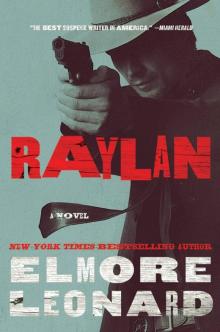 Raylan
Raylan Touch
Touch Mr Majestyk
Mr Majestyk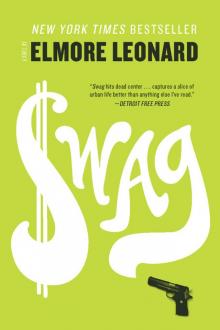 Swag
Swag Road Dogs
Road Dogs La Brava
La Brava The Hot Kid
The Hot Kid Valdez Is Coming: A Novel
Valdez Is Coming: A Novel Be Cool
Be Cool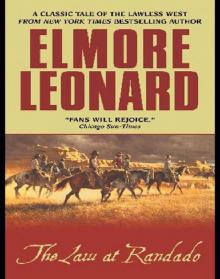 The Law at Randado
The Law at Randado The Bounty Hunters
The Bounty Hunters When the Women Come Out to Dance
When the Women Come Out to Dance 310 to Yuma and Other Stories (1953)
310 to Yuma and Other Stories (1953)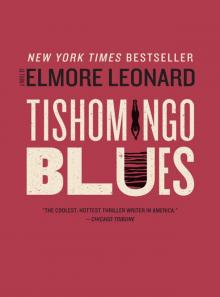 Tishomingo Blues
Tishomingo Blues Cat Chaser
Cat Chaser Pagan Babies
Pagan Babies Elmore Leonard's Western Roundup #1
Elmore Leonard's Western Roundup #1 52 Pickup
52 Pickup Stick
Stick The Moonshine War
The Moonshine War Valdez Is Coming
Valdez Is Coming City Primeval
City Primeval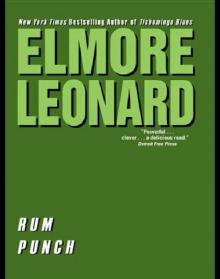 Rum Punch
Rum Punch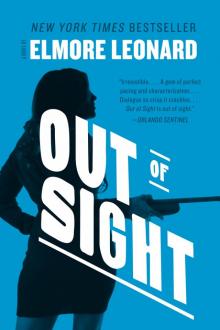 Out of Sight
Out of Sight Naked Came the Manatee (1996)
Naked Came the Manatee (1996) Killshot
Killshot Cuba Libre
Cuba Libre Forty Lashes Less One
Forty Lashes Less One The Complete Western Stories of Elmore Leonard
The Complete Western Stories of Elmore Leonard Pronto
Pronto Split Images
Split Images Last Stand at Saber River
Last Stand at Saber River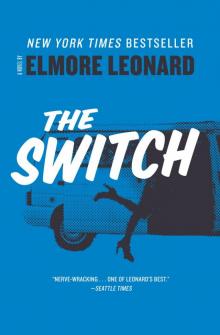 The Switch
The Switch Three-Ten to Yuma and Other Stories
Three-Ten to Yuma and Other Stories Bandits
Bandits Comfort to the Enemy and Other Carl Webster Stories
Comfort to the Enemy and Other Carl Webster Stories Hombre
Hombre Trail of the Apache and Other Stories
Trail of the Apache and Other Stories LaBrava
LaBrava Gold Coast
Gold Coast Jackie Brown
Jackie Brown Escape From Five Shadows
Escape From Five Shadows Karen Makes out (1996)
Karen Makes out (1996) Up in Honey's Room
Up in Honey's Room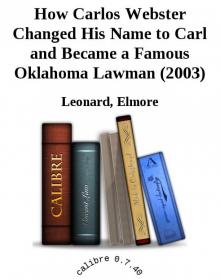 How Carlos Webster Changed His Name to Carl and Became a Famous Oklahoma Lawman (2003)
How Carlos Webster Changed His Name to Carl and Became a Famous Oklahoma Lawman (2003) Mr. Paradise
Mr. Paradise The Hunted
The Hunted Freaky Deaky
Freaky Deaky Louly and Pretty Boy (Ss)
Louly and Pretty Boy (Ss) Glitz
Glitz A Coyote's in the House
A Coyote's in the House The Big Bounce jr-1
The Big Bounce jr-1 Up in Honey's Room cw-2
Up in Honey's Room cw-2 Unknown Man #89 jr-3
Unknown Man #89 jr-3 Get Shorty: A Novel cp-1
Get Shorty: A Novel cp-1 Gunsights
Gunsights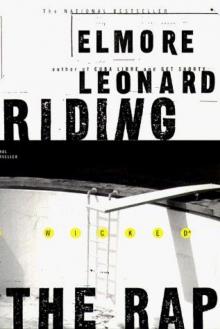 Riding the Rap rg-2
Riding the Rap rg-2